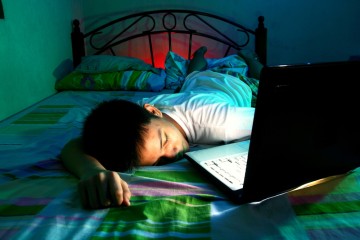Screen Time, Kids and Sleep Don’t Mix
Contributed by: Tracy Carbone, M.D.
Dr. Carbone is the Director of The Valley Hospital Pediatric Sleep Disorders and Apnea Center
 As you prepare your children for the start of a new school year, make sure you put “get enough sleep” on their back-to-school lists. One way to do this is to cut back on their screen time before bedtime.
As you prepare your children for the start of a new school year, make sure you put “get enough sleep” on their back-to-school lists. One way to do this is to cut back on their screen time before bedtime.
The National Sleep Foundation’s 2011 Sleep in America Poll found that 63 percent of Americans are not getting enough sleep during the week. The survey also found that 95 percent of Americans use some sort of electronics — such as a television, computer, video game or cell phone — at least a few nights a week within the hour before going to bed. Studies have shown that the light emitted from these devices can disrupt sleep by delaying the body’s release of the sleep-promoting hormone melatonin. In addition, the poll also found that about one in 10 adolescents between the ages 13 to 18 reported being awakened after they go to bed by a phone call, text message or e-mail.
The use of electronics before bed is a big concern because it disrupts the body’s natural production of melatonin. Parents need to be aware that children’s poor sleep habits have a direct effect on their daytime behavior. Children who do not get sufficient sleep appear sleepy or overtired during the day and they may have difficulty waking in the morning. Poor sleep habits, if left unaddressed, can lead to behavior problems and learning difficulties in the classroom.
Regular sound sleep is so important to children’s health and well-being, and I encourage parents to make sleep a priority for their children.
The following tips can help parents ensure their children get a good night’s sleep:
- Limit or eliminate the use of computers or televisions in children’s bedrooms or right before bed.
- Limit their intake of caffeinated soft drinks. These should be avoided completely in the late afternoon or evening.
- Enforce a regular bedtime and maintaining a bedtime routine that helps kids wind down before going to bed.
- Look for signs of sleep deprivation in your children.
- Create a sleep-promoting environment that is cool, quiet and dark.
- Consult a sleep expert if they are concerned about their children’s sleeping habits.



















